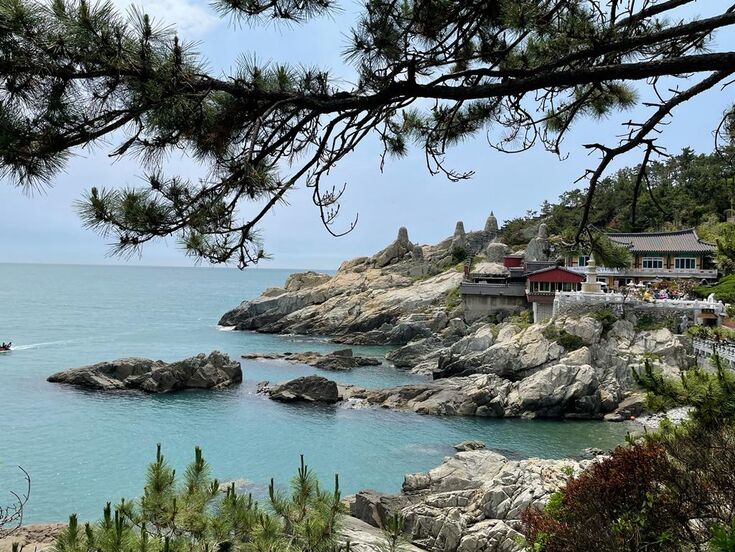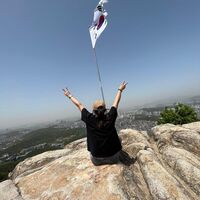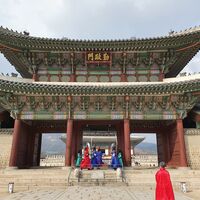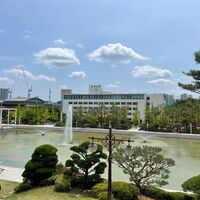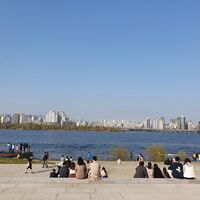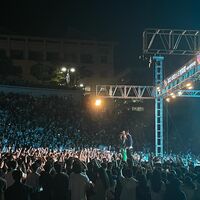PROMOS semester abroad experience report
I decided to spend my semester abroad in South Korea because I am very interested in Korean culture and it has always been one of the countries I really wanted to visit. Due to the Corona pandemic, my whole plan was made much more difficult. But luckily, Korea had already opened the borders for students at that time. So, through an organization called "Asia Exchange", I applied for Hanyang University in Ansan. The application process was very easy and I received my acceptance the very next day. I registered for the specialisation "Business Administration" (BWL) at the university, (as there was no similar course to Textile and Clothing Technology to choose from), however I was also able to choose courses from all the other specialisations offered at the university. My main goals of the semester abroad were to improve my English skills, learn about Korean culture, and gain new experiences.
Preparations First, I had to apply for an international health insurance, credit card, and student visa for South Korea. Due to Corona, it was also necessary to prepare quarantine accommodation. I decided not to live in the dormitory on campus in Ansan (about 40km from Seoul), but in Seoul, because I heard from some students of the university that it could be a bit boring in Ansan. Since there were also some lectures online through Corona, I was aware that I didn't have to go to the university every day.
Course selection and lectures The course selection process was a bit different than in Germany. There were 2 course selection periods where I can choose, deselect and re-select courses. The first period was before the semester started and the second period was in the first week of the semester. After that, there was an additional period where you could still deselect courses. As soon as the course selection periods started, I had to be quick because all courses cannot exceed a certain number of courses and the popular courses were already full after a few seconds. The advantage of this course selection system is that you can look at the selected courses in the first week of lectures and afterwards you still have the possibility to decide whether you want to change or deselect the course after all. It should be noted that 1 Korean credit point is equivalent to 2 ECTS. I took 3 courses and 1 Korean language course for beginners. Each course takes place 2x per week, 1.5h each. Due to the online and hybrid courses, I had to go to the university 2-3x per week. The course system in South Korea was new to me and I had to get used to it first. The online portal of the university helped me a lot, because you could track everything there. Scripts, assignments, news and even lectures took place via this portal. In South Korea, attendance is compulsory at universities. You have to meet a minimum attendance, otherwise you automatically fail the course. In addition, there are 2 exam periods in a semester that have to be mastered. Once in the middle of the semester the "Mid-term Exams" take place and at the end of the semester the "Final Exams". In between you have to do different projects or homework. The final grade is divided in advance in percentages: attendance, participation, mid-term exam and final exam possibly homework or project assignment. So I was able to adjust well to the classes and had something to do throughout the semester. Nevertheless, everything was very doable and I still had enough free time for activities outside of the university.
University and Student Life When I first entered the campus of Hanyang University, I couldn't find my way around because it was so big. I was most surprised by the golf course on campus. I mostly spent time in the dining hall, convenience store, or café, which was also a study area. The food selection on campus is very large, there were 3 different dining halls and even more food areas at very reasonable prices. In addition, I was very impressed by the concept of learning cafés in South Korea, which you can find not only on campus, but also in Seoul I tried out the various cafés for learning. Learning cafés in Korea are particularly popular because most students only have small rooms or even have to share them with several students in the dormitories. The university also offers a variety of student clubs, which you can register for at the beginning of the semester, such as sports and music clubs. The biggest highlight for me was the Unifestival, which takes place every summer over several days. Admission is free for everyone. The Unifestivals are a tradition in South Korea and should definitely not be missed. There are even famous artists performing, such as Psy.
Life in Seoul When I got out of quarantine in Seoul, I first had to orient myself in the city, as it is simply huge with almost 9.8 million inhabitants. Seoul has many different neighborhoods, all of which are very different. I lived in the district called "Mapo-Gu," which is very popular with study abroad students because it is also a slightly cheaper area. I lived there with two other friends in a shared apartment. Mapo-Gu is a very lively neighborhood. Especially on weekends, for example, there are many street musicians or dancers. The character, the atmosphere, the cityscape, the age group in each district are so different that you could think that each district is its own city. This is something I really appreciate about Seoul, because you can see so many different sides in one city. There is always something to discover in Seoul. From activities such as hiking in the beautiful mountains, singing karaoke or going to concerts, to sightseeing and trying out many restaurants and cafes, which was my personal favorite, you never get bored. I basically ate out because it was relatively cheap and you could find good little restaurants or snack bars everywhere. In addition, fruits and vegetables are relatively expensive in South Korea, so it's not worth investing time in cooking. Also, Korean food is very meat-heavy, so it's a bit more difficult for vegetarians and vegans to find good restaurants.
After the semester I used my time to travel to other cities in South Korea, like Busan and Jeju Island, which was a nice comparison to the big city life to see another side of South Korea.
Culture My impressions of Korea are that everyone is always very friendly, respectful and orderly with each other. There are many cultural things that you have to get used to first, like handing over objects or money is always done with 2 hands, otherwise it seems disrespectful. The behavior on public transportation is also different from ours. There is always a line formed in front of the subway door or at the bus stop, so there is no jostling or also that people do not talk loudly, because many people sleep in public transportation. These are things you have to figure out first in everyday life. What I really like about Korea is the security. Because all streets and buildings are under video surveillance (CCTV), which takes some getting used to at first, the crime rate is very low in South Korea. Especially as a woman I feel very safe to walk alone through the city at night. On the other hand, I noticed the high alcohol consumption in Korea. Alcohol can and is often consumed with almost every meal. In addition, I also noticed the high performance and beauty pressure in society. Status and appearance is very important to Koreans.
Conclusion
I can highly recommend it to everyone to do a semester abroad in South Korea, because you get to know a completely new culture and way of life, which is so diverse and exciting. Also, the experience as a student in South Korea is very new and eventful.


